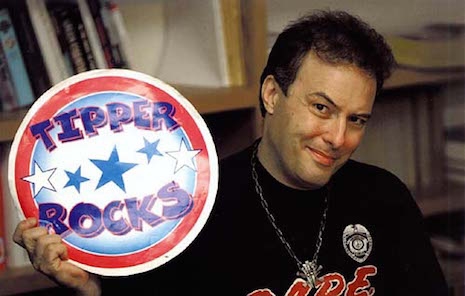
In the 1980s, the elected-to-nothing wife of then-Senator Albert Gore Jr. made quite a splash for herself when she formed the Parents Music Resource Center in 1985 with three other prominent Washington wives. The group called attention to lascivious and offensive lyrics in pop music, including those by Prince, Madonna, Cyndi Lauper alongside more familiar targets like Black Sabbath, and was instrumental in creating the single most “1980s” cover element on CD covers, the ubiquitous “PARENTAL ADVISORY: EXPLICIT LYRICS” rectangle, often found on one of the bottom corners.
Gore, naturally, protested that she was never interested in censoring anyone but the desire to use rating systems or warning labels in a corporate context inevitably has a chilling effect on speech and explicit content.
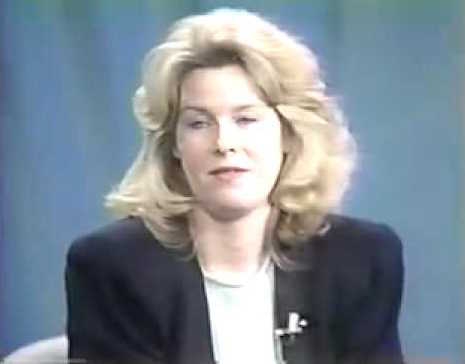
Understandably, Tipper Gore rapidly became Public Enemy #1 for fans of heavy metal and punk rock. (Indeed, I’m sure you could do a decent compilation of songs calling out the PMRC in their very titles.) When Bill Clinton named Al Gore to be his running mate in 1992, in an election they would ultimately win and which would delight liberals of all stripes as representing the end of the Reagan era, the existence of Tipper as a potential Second Lady was for principled rock fans a serious obstacle to voting for Clinton—indeed, DM head honcho Richard Metzger has never cast a vote for Al Gore largely for this reason, and bravo to him! Whatever benefit she was providing “parents,” the PMRC represented a generational war between Boomers and their children, even though its goals would be recognized as an utter affront to so many Boomer heroes like Jimi Hendrix, Jim Morrison, Grace Slick, etc.
The PMRC singled out a few acts that represented their view of unacceptable excess in rock and roll content. They were known as the “Filthy Fifteen”:
Prince, “Darling Nikki” (sex/masturbation)
Sheena Easton, “Sugar Walls,” (sex)
Judas Priest, “Eat Me Alive,” (sex)
Vanity, “Strap On ‘Robbie Baby’” (sex)
Mötley Crüe, “Bastard” (violence/language)
AC/DC, “Let Me Put My Love Into You” (sex)
Twisted Sister, “We’re Not Gonna Take It” (violence)
Madonna, “Dress You Up” (sex)
W.A.S.P., “Animal (Fuck Like a Beast)” (sex/language)
Def Leppard, “High ‘n’ Dry (Saturday Night)” (drug and alcohol use)
Mercyful Fate, “Into the Coven” (occult)
Black Sabbath, “Trashed” (drug and alcohol use)
Mary Jane Girls, “In My House” (sex)
Venom, “Possessed” (occult)
Cyndi Lauper, “She Bop” (sex/masturbation)
The PMRC was the best thing that ever happened to, say, W.A.S.P.—I scarcely remember any coverage about that band that wasn’t about “Animal (Fuck Like a Beast).”
In November 1986 CREEM magazine published a letter from Gore responding to a column by John Mendelssohn in which she defended herself against charges that she was an “uptight prude who wants to ban rock.” Eager to present herself as a fan of rock and roll, even of “the normal sex and sensuality of rock ‘n’ roll,” Gore depicted herself as undertaking the “responsible action” of protesting “the current excess of a minority of powerful artists.” Not unreasonably, she also framed her campaign in a feminist light, in that she was fighting “a degrading attitude” towards women, although without ever explaining how restricting the reach of a song like Cyndi Lauper’s “She Bop” fostered that goal.
In a later issue, Jello Biafra wrote in to debate Gore, accusing Gore and the PMRC of playing a 1980s version of Joe McCarthy and HUAC. Biafra pointed out that the climate for censorship was already plenty chilly, what with Republican Attorney General Ed Meese going after Playboy and Penthouse.
Most of the arguments about the PMRC’s methods are somewhat abstract—will this or that act prevent or foster this or that reaction? But Biafra pointed out that the PMRC was having real-world effects on working bands, specifically Biafra’s band the Dead Kennedys, who were facing the prospect of “a year in jail and a $2,000 fine” because of “what the Dead Kennedys say with their records.” Opponents of bodies like the PMRC are quick to say that they only end up benefiting their targets by increasing their sales, but Biafra disputed this point, noting that “more and more stores are now afraid to carry our records out of fear of being dragged through the nearest kangaroo court.”
Read the exchange for yourself, it’s well worth a read. You can see a larger version of these images by clicking on them.
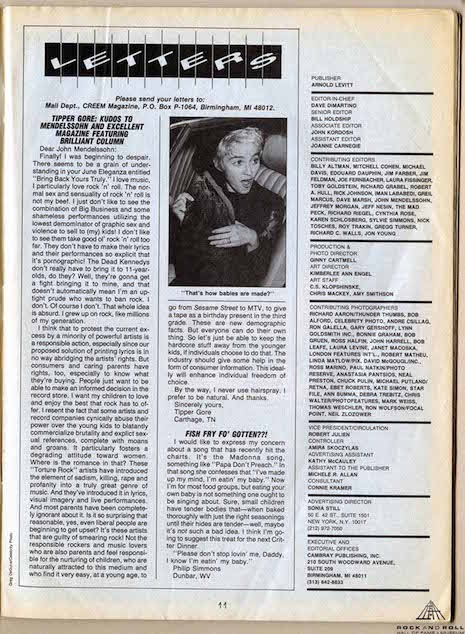
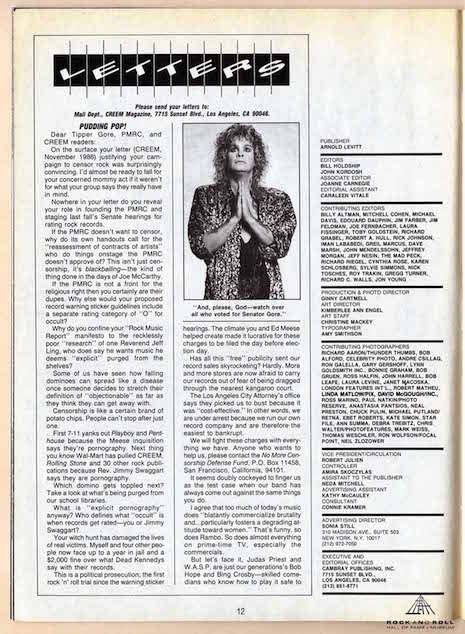
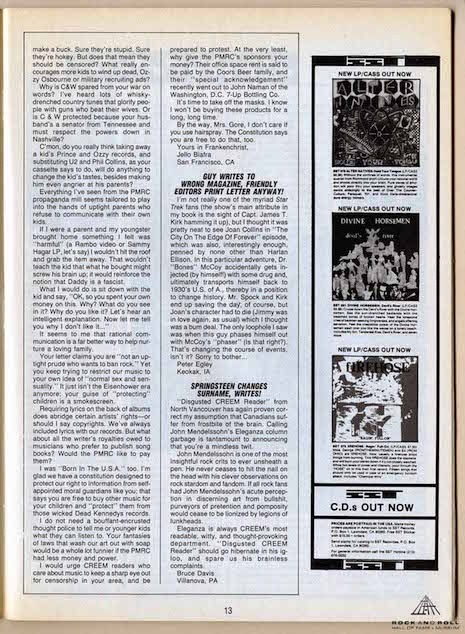
Biafra would remain one of Gore’s harshest critics for many years. He dedicated a lengthy chunk of his first spoken word album, No More Cocoons, to a reading of this letter, the one he wrote responding to Gore in CREEM. On the Dead Kennedys live album Mutiny on the Bay, during their song “M.T.V.—Get off the Air,” Biafra tells the audience to “buy a homemade [record] instead, before the PMRC closes the stores down that sell ‘em”.
I found this issue of CREEM at the Rock Hall’s Library and Archives, which is located at the Tommy LiPuma Center for Creative Arts on Cuyahoga Community College’s Metropolitan Campus in Cleveland, Ohio. It is free and open to the public. Visit their website for more information.
Here’s a video from that era of Biafra and Gore on Oprah. Biafra’s mention of Willie Horton places this after the 1988 presidential election, so a good while after the above letters appeared.